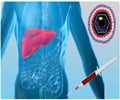A novel approach to the development of universal treatments for viral illnesses such as common cold, meningitis, encephalitis has been devised by UC Irvine microbiologists.

For many years, scientists have known that viruses rely on functions provided by their host cells to increase their numbers, but the UCI study - led by microbiology and molecular genetics professor Bert Semler - is the first to identify how the RNA-containing picornaviruses utilize a DNA repair enzyme to do so.
RNA viruses have ribonucleic acid as their genetic material (rather than deoxyribonucleic acid, or DNA). Notable human diseases caused by RNA viruses include SARS, influenza, hepatitis C, West Nile fever, the common cold and poliomyelitis.
The UCI and Dutch researchers examined one group of RNA viruses, called picornaviruses, using biochemical purification methods and confocal microscopy to see how they co-opt the functions of a cellular DNA repair enzyme called TDP2 to advance their replication process.
"These findings are significant because all known picornaviruses harbor the target for this DNA repair enzyme, despite the fact that their genetic material is made up of RNA rather than DNA. Thus, identifying drugs or small molecules that interfere with the interaction between the virus and TDP2 could result in a broad-spectrum treatment for picornaviruses," said Semler, who also directs UCI's Center for Virus Research.
By targeting a host cell function required for viral replication and not the virus itself, he added, the primary challenge of antiviral drug resistance may be sidestepped.
Advertisement
A drug that blocks RNA viruses from hijacking DNA repair enzymes may avoid these resistance issues. Semler's lab plans to screen mixtures of drug candidates to find ones that inhibit this process in cells infected by the human rhinovirus, the predominant cause of the common cold.
Advertisement
Source-ANI









